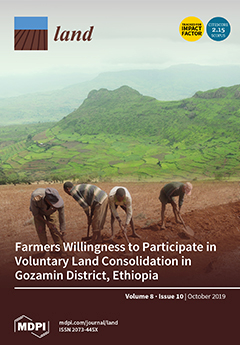Resource information
In many African countries and especially in the highlands of Ethiopia—the investigation site of this paper—agricultural land is highly fragmented. Small and scattered parcels impede a necessary increase in agricultural efficiency. Land consolidation is a proper tool to solve inefficiencies in agricultural production, as it enables consolidating plots based on the consent of landholders. Its major benefits are that individual farms get larger, more compact, contiguous parcels, resulting in lower cultivation efforts. This paper investigates the determinants influencing the willingness of landholder farmers to participate in voluntary land consolidation processes. The study was conducted in Gozamin District, Amhara Region, Ethiopia. The study was mainly based on survey data collected from 343 randomly selected landholder farmers. In addition, structured interviews and focus group discussions with farmers were held. The collected data were analyzed quantitatively mainly by using a logistic regression model and qualitatively by using focus group discussions and expert panels. According to the results, landholder farmers are predominantly willing to participate in voluntary land consolidation (66.8%), while a substantive fraction of farmers express unease with voluntary land consolidation. The study highlighted the following four determinants to be significant in influencing the willingness of farmers for voluntary land consolidation: (1) the exchange should preferably happen with parcels of neighbors, (2) land consolidation should lead to better arranged parcels, (3) nearness of plots to the farmstead, and (4) an expected improvement in productivity. Interestingly, the majority of farmers believes that land consolidation could reduce land use conflicts. The study provides evidence that policymakers should consider these socio-economic, legal, cultural, infrastructural, and land-related factors when designing and implementing voluntary land consolidation policies and programs.


